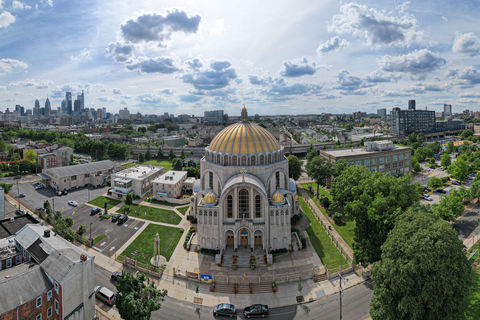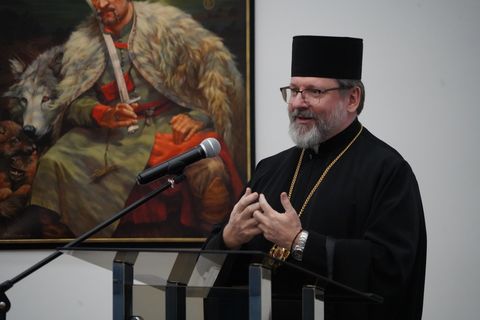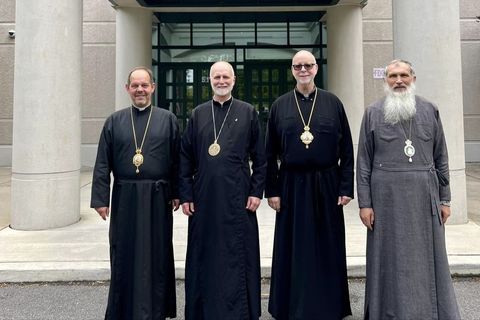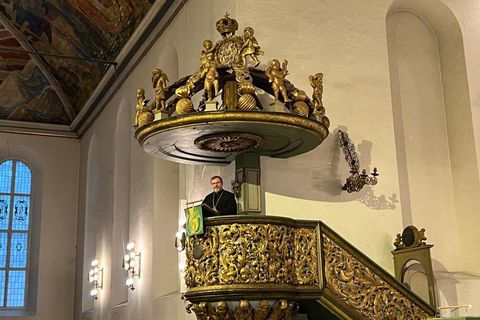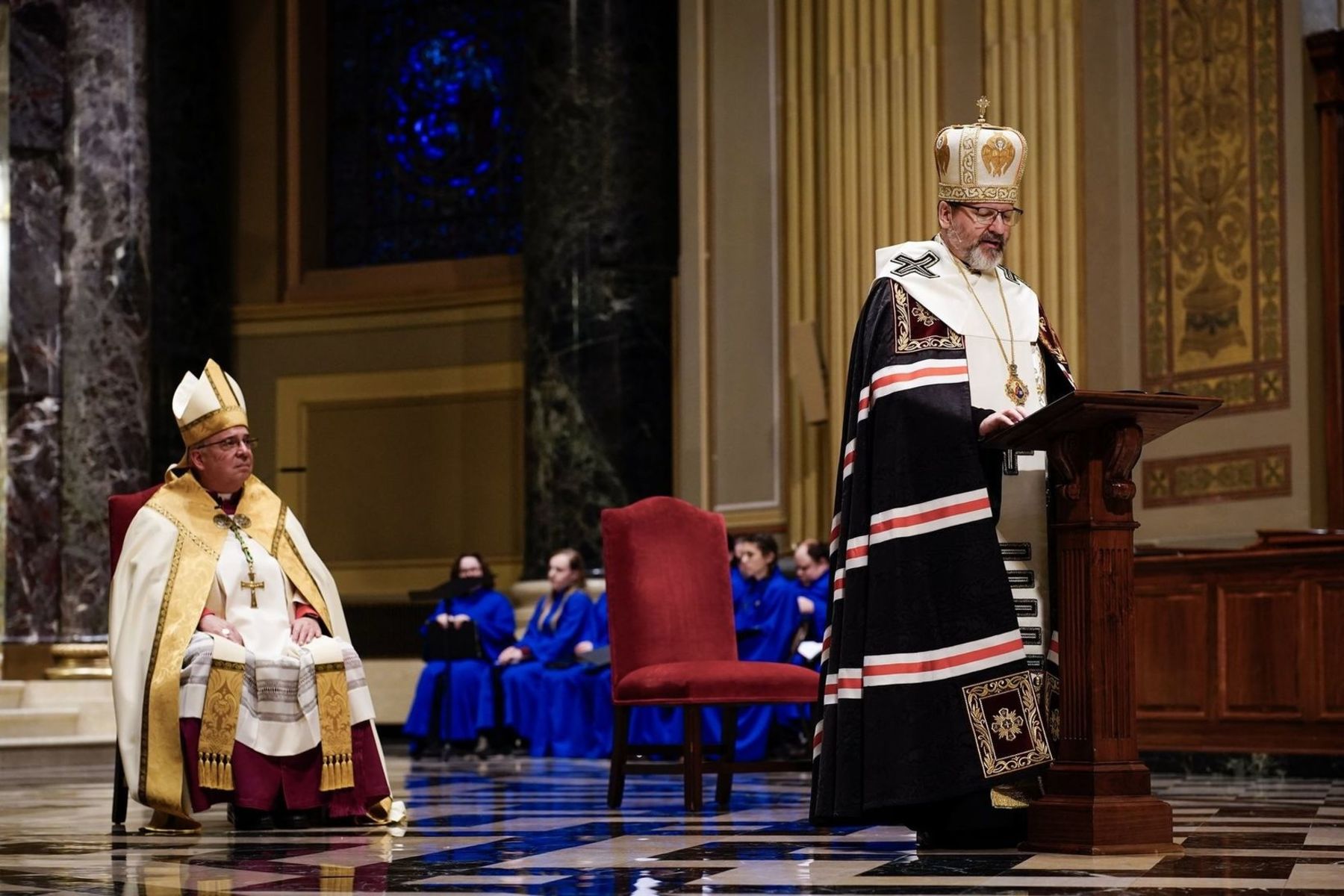
Address of His Beatitude Sviatoslav during the Ecumenical Prayer for Peace in Ukraine in Philadelphia
Dear Brothers and Sisters,
It has become my annual tradition—my pilgrimage—to come to Philadelphia, to the City of Brotherly Love.
Dear brother bishops, dear faithful, I stand before you today with deep gratitude. Thank you for standing with me, with our Church, and with Ukraine. Your love and solidarity are my solace, giving me the strength to comfort those I am called to serve—my fellow Ukrainians, who now are getting mixed signals about the international support and are anxious about the future. But you are here with us! Your support empowers me to wipe away the tears of widows and orphans who have lost their loved ones, to find the right words for our wounded soldiers, and to console those whose homes and lives have been shattered. We draw our strength from you—your prayers, your generosity, your presence. Your solidarity keeps us standing.
I am deeply grateful for your love, your compassion, and your charity.
In just a few days, we mark a somber anniversary—three years since the full-scale Russian war against Ukraine began.
It is a painful anniversary. Three years of death and destruction, struggle and suffering, tears and sweat. Three harsh winters. Three scorching summers. Power outages and blackouts. Strikes on civilians. Attacks on infrastructure. Our people, our cities, our land bear deep wounds. Each time I return from my travels, I witness with sorrow that something else is gone—another building reduced to rubble, another scar on the body of my beloved Ukraine.
Yet, this is also a glorious anniversary. Three years of resistance and resilience. Three years of love and hope. In February 2022, Russia gave us three days to surrender; international experts predicted we would last only a few weeks. The danger was real and immediate—and personal. Russian forces advanced to within 15 miles of Kyiv, and later, our security services informed me that I, along with many others, was on a hit list.
This is not an exaggeration or excessive drama. My predecessor and the mentor of our Archbishop Borys, Patriarch Josyf Slipyj, endured 18 years in Soviet gulags. Bishops Nykyta Budka and Hryhoriy Khomyshyn perished in Soviet captivity, and their burial sites remain unknown.
For 45 years, our Church survived underground, hidden in the catacombs. History has shown that every time Russia occupies Ukraine, our Church faces persecution and attempts at eradication. Today is no exception. The Ukrainian Greek Catholic Church has been declared illegal in the territories of eastern Ukraine that are temporarily occupied by Russia.
At this very moment, our faithful are once again forced into the catacombs, without access to a Catholic priest, deprived of the sacraments, and left to practice their faith in secrecy.
And yet, by God’s grace, after three years, I stand here with you today.
We are praying together.
And Ukraine is still standing! Ukraine is still fighting! Ukraine is still praying!
This miracle has been made possible through immense sacrifice. Every day at 9 a.m., the nation pauses to mourn its fallen soldiers. Every day, Ukraine buries its best sons and daughters—those who have embodied the Gospel truth:
“No one has greater love than this, to lay down one’s life for one’s friends.” (John 15:13)
They are laying down their lives for me. For you. For all of us. For life and for truth. To defend democracy and to protect the innocent.
I do not stand before you today to speak of evil and pain. I am not here to complain or lament. If you are here, you already know much about it. You know about death and destruction, about the genocidal cruelty of collective Putin. You know about the persecution of the Church.
But many in this country ask: Why do Ukrainians continue to fight? What are they fighting for?
The answer is striking in its simplicity: we are fighting for our freedom and dignity—for the right to live freely in our own land. This idea is deeply rooted in the American way of life. Our nations understand that freedom is not free, and at this moment, Ukrainians are paying the highest price for it. We also know that no one is truly free until everyone is free. Ukraine is not fighting for land alone—we are fighting for people.
We cannot surrender the dignity of Kherson. We cannot trade away the freedom of Kharkiv. We cannot betray our people. Ukrainians are fighting for life itself.
What do we want?
We want peace. Every Ukrainian longs for peace—for nights without air raid sirens, for mornings without explosions, for days without casualties and nights without fear. But a ceasefire is not peace, and a political deal cannot bring justice. A truce that leaves people suffering under occupation is a cruel mockery. Without justice, peace is impossible—it becomes an illusion, a hollow promise.
Ukrainians yearn for a just and lasting peace. A peace that not only stops the bloodshed but also restores dignity and freedom for all.
We, Catholics, mark the Jubilee Year of Hope. My desire is to bring hope, to encourage you, and to share with you the source of Ukrainian strength and resilience.
What sustains us? What keeps us from falling?
We can resist evil and hatred, and we have hope precisely because we believe in God! We believe that it is He who “executes justice for the oppressed, gives food to the hungry. The Lord sets the prisoners free… protects the strangers, upholds the orphan and the widow” (Psalm 146:7,9).
We know that God is with us.
I would like to share with you a story told by my former student at the Ukrainian Catholic University. In the first days of the war, he volunteered and joined the Ukrainian Defense Forces.
One day, he and his fellow soldiers were driving through villages near the Ukrainian capital that had just been liberated. Everywhere they looked, they saw devastation—destroyed buildings, frightened people, deep misery. Overwhelmed by the suffering around them, they struggled to process what they were witnessing.
Then, one of his friends, knowing that he had studied theology, turned to him and asked, “And where is your God?”
At that moment, my former student had no answer. The weight of the suffering was too great. But just a few minutes later, they came across a group of volunteers who had followed the troops into the devastated villages—even though the sidewalks and buildings were still littered with booby traps. Risking their own lives, these volunteers distributed food and hygiene supplies, embraced the terrified people, and offered them words of comfort. And then he knew the answer.
“God is here. God is in them.”
God is always on the side of the innocent victim. He stands with us.
God is here.
We stand because millions of people around the world—people like you—pray for us and support us. They believe that goodness and truth have their own divine power, and evil, lies, and death will never have the final word.
We live because we are not alone!
Thank you for being with us!
† SVIATOSLAV
